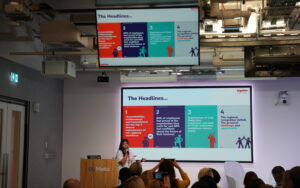Are you finding yourself consistently late to work? Whether it is due to lack of sleep, long commutes, or family obligations, being a few minutes late might seem harmless. But, what happens when those late arrivals start piling up and lead to warnings or even salary deductions?
Lucy d’Abo, CEO of together, weighs in on whether this is a personal problem, or perhaps an indicator of challenges in the broader workplace culture.
She says, “Workplaces are certainly trending to increased flexibility in where, when, and how work gets done. However, the reality is that not every company will be able, or willing to offer the same degree of flexibility. This does not automatically mean they must operate in a punitive culture. You can still build a positive culture, regardless of how stringent your rules are.
To create alignment across your workforce, focus on these three things:
- Whatever your timekeeping policy, make sure it is communicated well so expectations are clear.
- Keep employees connected to your company’s purpose, so they find meaning and motivation in their work – so they aren’t sat just watching the clock.
- Ensure your leadership team are role models of the company values and expected behaviours.
By effectively achieving these, you are likely to have created a high trust culture. According to Harvard Business Review, high trust environments show 50% higher productivity, 76% more engagement, and 40% less burnout compared to those in low-trust environments. Additionally, these employees report 74% lower stress levels and 29% greater satisfaction with their lives.
There may still be some instances of non-compliance, but remember, behaviour change takes time. Keep the feedback loop open, and create the environment helps people succeed.”




